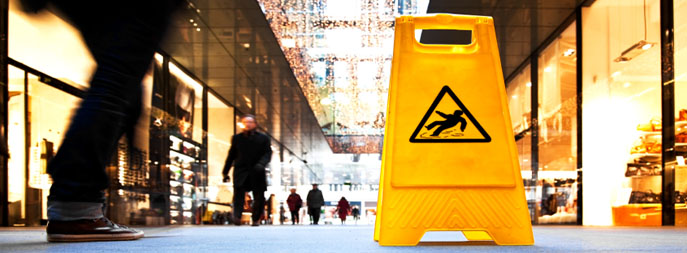
Slip and falls happen frequently. A person will slip or trip and fall on a wet floor, over a raised curb, or for some other reason.
In the event of such an accident, the question is always whether the owner or manager of the property can be held legally liable for the injuries sustained by the victim.
An owner of property does not ensure that the property is safe. Sometimes, things fall to the floor, or get placed there by some unknown third party. A property owner must take precautions however, to keep their property safe. These cases are often heavily fact-bound and if you have been involved in such an accident, you should consult with an attorney as soon as possible.
In general, to be held legally liable, a property owner must have either caused the dangerous condition or known or should have known about it and failed to correct it. These cases are almost always brought as negligence claims, and those claims hinge on whether the owner acted reasonably under the circumstances.
The question turns to some extent, on an analysis of whether the accident could have been avoided if the property owner was more careful. The property owner’s care and actions are balanced against the injured party’s possible negligence. Many jurisdictions use the rule of comparative negligence. If the injured party was negligent in not looking before stepping, they will be precluded from collecting some of all of their damages. This often happens when the person walking is distracted in some way. This may sound harsh, but the reasoning is that a negligent victim must share some of all of the blame. In essence, the principles with underlie negligence, allocate risk.
Some of the types of facts that tend to lean liability toward or away from the property owner follow. The longer the dangerous condition exists without being attended to, the more likely it is that the owner will be held liable. Is there any legitimate reason for the article to have been left on the ground? If so, was there any way for the owner to warn that the article was on the ground. This happens quite often in a grocery store. Someone will spill something on the floor and if the employees cannot clean it up right away, they place a warning placard near it.
Did the property owner have a mechanism for inspecting the property regularly and did they follow that protocol? If so, this tends to mitigate against a finding of liability against the owner. Were there other mitigating factors at the time, such a poor lighting, or poor weather conditions?
All of these factors are best analyzed by an attorney with experience in personal injury law. An attorney will be able to answer questions you may have about this surprisingly complicated area of the law, including ‘Do I have any rights if I slip and fall?’


